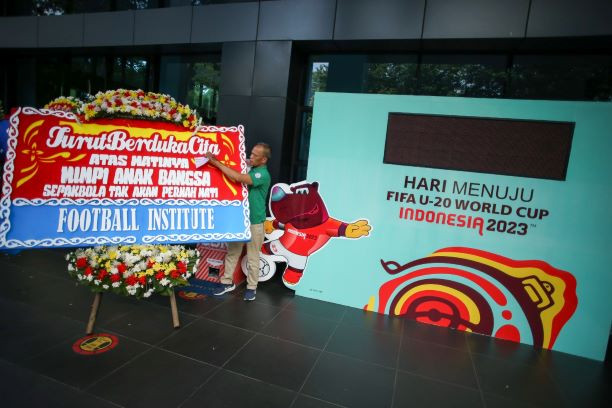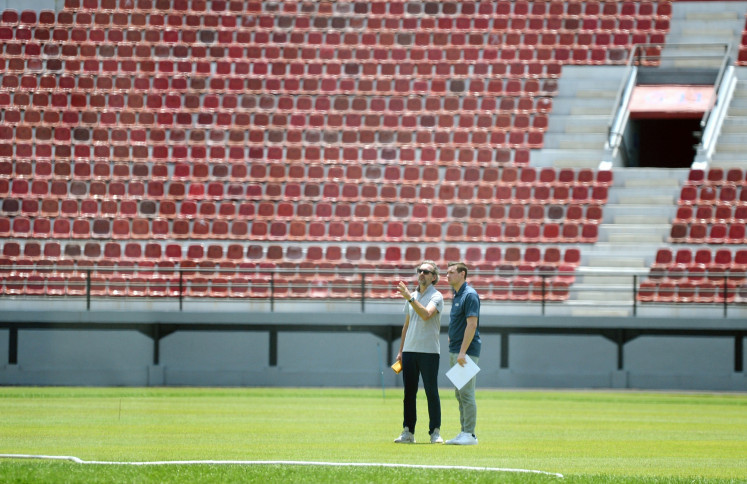April 3, 2023
JAKARTA – Indonesian soccer movers, among them naturalized players, and the public are devastated by FIFA’s decision to revoke Indonesia’s standing as U-20 World Cup host after a political storm over Israel’s participation in the tournament.
“Following today’s meeting between FIFA President Gianni Infantino and President of the Soccer Association of Indonesia [PSSI] Erick Thohir, FIFA has decided, due to the current circumstances, to remove Indonesia as the host of the FIFA U-20 World Cup 2023,” said FIFA on its website www.fifa.com in the evening of Wednesday, March 29. “A new host will be announced as soon as possible, with the dates of the tournament currently remaining unchanged. Potential sanctions against the PSSI may also be decided at a later stage.”
 An employee places a flower garland inside the Bung Karno Stadium premises on Thursday from Indonesian soccer fans who are disappointed with the country’s loss of its right to host the FIFA U-20 World Cup. (Antara/Rivan Awal Lingga)
An employee places a flower garland inside the Bung Karno Stadium premises on Thursday from Indonesian soccer fans who are disappointed with the country’s loss of its right to host the FIFA U-20 World Cup. (Antara/Rivan Awal Lingga)
Crushed hopes and heartbreak
Couched in bland bureaucratic speak, the statement broke millions of Indonesia’s hearts, not least the country’s soccer aficionados. Among them are Akmal Marhali, coordinator of the Save Our Soccer NGO. Akmal directed his wrath at politicians of the ruling Indonesian Democratic Party of Struggle Party (PDI-P), as well as groups like the Muslim hardline 212 Alumni Movement, who spoke out against Israel’s participation in the U-20 World Cup.
“[Central Java governor] Ganjar Pranowo and [Bali governor] I Wayan Koster, should shoulder the blame for the U-20 World Cup fiasco. They should apologize and resign for their actions, or face class action lawsuit for letting down stakeholders for the U-20 World Cup, among them small and medium businesses, young Indonesian players in the U-20 squad, as well as 275 million Indonesians,” said Akmal to The Jakarta Post on March 30.
He also voiced concerns that government intervention with the PSSI torpedoed Indonesia’s hopes of hosting the tournament and jeopardized the country’s standing with FIFA.
“If the Indonesian government had reservations about Israel’s participation in the U-20 World Cup, they should have said so when that country qualified for the tournament in July 2022. After all, Indonesia needs FIFA instead of vice versa.”
Soccer analyst Gita Suwondo is equally pessimistic.
“The repercussions from Indonesia’s failure to host the U-20 World Cup will be long-lasting. The international community’s loss of confidence toward Indonesia will cost us dearly if we make a bid to host either the 2034 or 2038 World Cup, as well as the 2036 Olympics,” he said.
But Gita still hoped that FIFA would soften the blow. “FIFA stripped Peru of its right to host the U-17 World Cup in 2019, citing security risks, but they did not penalize the country’s soccer federation. In our case, FIFA blamed the Indonesian government for intervening [in the U-20 World Cup], not the PSSI. So, hopefully Indonesia will avoid any sanctions from FIFA.”
Kompas TV news station estimated that the cancellation of the U-20 World Cup tournament cost the state at least Rp 675 billion (USD 45 million) in preparations for the Indonesian squad and renovations for the stadiums where the games would be held, among them Manahan Stadium in Solo, Central Java, Jakabaring Stadium in Palembang, South Sumatra, and Gelora Bung Karno Stadium in Jakarta. The media outlet also reported the National Development Planning Agency (Bappenas) calculated lost revenue from domestic and foreign and domestic tourists at Rp 1.8 trillion to 1.9 trillion. The agency based the figures on earnings from the 1.7 million domestic and 78,854 foreign tourists during the 2018 Asian Games hosted by Indonesia.
Deepening disillusionment
Among those whose confidence in Indonesia’s volatile soccer scene was shaken by the U-20 World Cup fiasco are the naturalized players and their older peers in the national team, as well as those playing in the Liga 1 top flight clubs and the Liga 2 second-tier sides. These players are still reeling at the prospect of restrictions on their numbers at both the national and league levels.
“[Naturalized players], particularly those at the U-20 level, will think twice before they play for Indonesia at both the national team and club levels in the near future after the U-20 World Cup fiasco,” said Gita. “Why would they trade in the security that their countries of origin provide for Indonesian citizenship, and the uncertainty that comes with it in their athletic careers?”
The bone of contention is a proposal by the Liga 1 top flight league and the Liga 2 second-tier competition to set quotas limiting the number of naturalized players in Persib and other teams for the 2023-2024 season. The www.detik.com news website reported that if passed, the quota would set the ratio from 4-to-1, or three non-Asian players and one Asian player, to 5-to-1, or four non-Asian players and one player from Southeast Asia.
 FIFA delegation members visit Kapten I Wayan Dipta Stadium in Gianyar, Bali, on March 27, 2023. The visit was conducted by FIFA to inspect the readiness of Kapten I Wayan Dipta Stadium as one of the venues of the 2023 FIFA U-20 World Cup soccer matches in May. ( Antara/Fikri Yusuf)
FIFA delegation members visit Kapten I Wayan Dipta Stadium in Gianyar, Bali, on March 27, 2023. The visit was conducted by FIFA to inspect the readiness of Kapten I Wayan Dipta Stadium as one of the venues of the 2023 FIFA U-20 World Cup soccer matches in May. ( Antara/Fikri Yusuf)
The Professional Footballers Association of Indonesia (APPI) deplored the proposal for squeezing the number of naturalized players.
“Restrictions on the number of naturalized players in a club is a violation of [their] Human Rights. After [the naturalized player] is declared an Indonesian citizen, he should obtain [sic] the same rights as other Indonesian citizens in accordance with the laws and regulations in force,” asserted APPI. “This is not in line with the Universal Declaration of Players’ rights and FIFA’s Human Rights Policy.”
Gita also criticized the policy, which he suspected was “an affirmative action by the clubs to develop local players by bringing in foreign athletes, and in doing so putting the squeeze on naturalized players. This policy originated during Erick’s tenure as PSSI chief,” said Gita. “I’m concerned that restricting foreign players would be counterproductive. Specifically, the message is the players are welcome [in Indonesia] when they are young and fit, but will be discriminated against when they age out.”
Diky Soemarno, head of the Jakmania fan club affiliated with Jakarta’s Liga 1 side Persija, agreed. However, he cited the original reasons for recruiting naturalized players.
“The trend of naturalizing players from overseas was carried out to bolster our national team, because our programs to train players at the youth level were ineffective. While we aim to learn from the know-how provided by naturalized players, we hope to be self-sufficient in player-development in 15 years or so.”
Persija Vice President and Director of Player Development Ganesha Putra reiterated Diky.
“Naturalizing players reflects the pluralism of soccer and using their know-how to keep up with the game today. At the end of the day, what counts is how good a player is, not their nationality or origins,” he said. “Instead of restricting their number, the PSSI should raise the question of whether it is necessary for the PSSI to keep naturalizing players from overseas.”
Yet naturalized Indonesian soccer international Marc Klok summarized the hopes and dilemmas of naturalized players best with his manifesto Kami WNI and Semua WNI Memiliki Hak yang Sama, which he wrote on his website www.marcklok.com.
“I believe that Indonesian football has great potential and can be on par with some of the best [soccer] leagues in the world. I see myself as a bridge […] in promoting greater understanding and collaboration between different football communities,” said the Dutch-born 29-year-old, who plays midfield in Indonesian Liga 1 side Persib Bandung and the Garuda, or national side, on his website www.marcklok.com since he was naturalized in 2020. “I hope to use my experiences and skills to help elevate Indonesian football and inspire young players to pursue their dreams.”
Yet the declaration perhaps hinted at Klok’s increasing disillusionment with Indonesian soccer.
“[While] my focus right now is playing for Persib Bandung and the Indonesian national team […] I am always open to exploring opportunities to play abroad if the right opportunity presents itself,” warned the soccer player, who has previous spells in the youth wing of the Dutch Eredivisie side Utrecht and Scottish league stalwarts Dundee. “As a professional football player, it is important to continue growing and developing my skills, and playing in different leagues and countries can help me do that.”
While Klok and other Indonesian players, both foreign-born or of local descent, have yet to follow through with their warnings, Indonesia’s U-20 World Cup disaster and plans to restrict the number of naturalized players might just induce them to put their plans into action.


